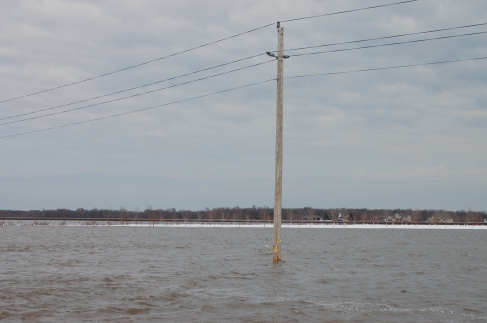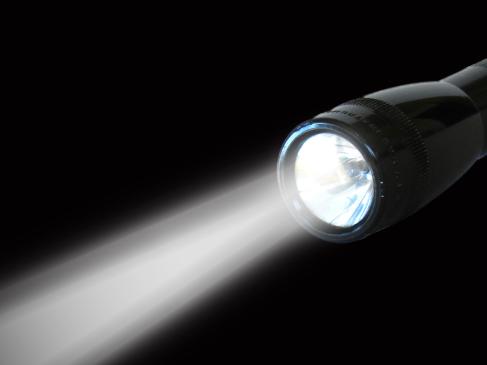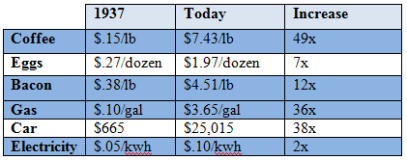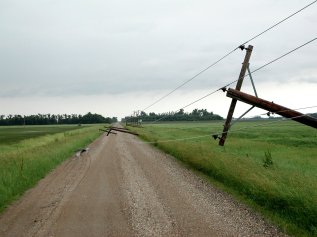We’ve moved The Outlet blog to a new platform over at Area Voices. All of our content, old and new, can be found at that new location. Visit us at http://ccecblog.areavoices.com/.
May is National Electrical Safety Month
This article is originally from the North Dakota Living Magazine produced by NDAREC.
April is wrapping up, which means May is just around the corner. And with May being National Electrical Safety Month, Cass County Electric Cooperative wants you to be aware of potential home electrical hazards and the importance of electrical safety. This year’s campaign, “Back to the Basics,” challenges consumers to make home electrical safety assessments a priority.
According to the Consumer Electronics Association, the average home today has a minimum of three televisions, two DVD players, at least one digital camera, one desktop computer, and two cell phones.
Many homes and their electrical systems were built before most modern-day home electronics and appliances were even invented. Today’s increased demand for energy can overburden an older home’s electrical system.
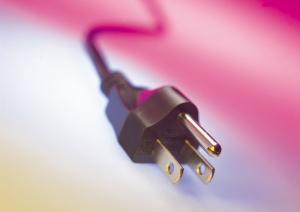
CCEC offers the following tips to help identify and eliminate electrical hazards to protect yourself, your family and your home:
- Make sure entertainment centers and computer equipment have plenty of space around them for ventilation.
- Use extension cords as a temporary solution, and never as a permanent power supply.
- Do not place extension cords in high-traffic areas, under carpets or across walkways, where they pose a potential tripping hazard.
- Use a surge protector to protect your computer and other electronic equipment from damage caused by voltage changes.
- Heavy reliance on power strips is an indication that you have too few outlets to address your needs. Have additional outlets installed by a qualified, licensed electrician.
- Keep liquids, including drinks, away from electrical items such as televisions and computers.
Here, we offer other tips:
BASICS FOR THE KIDS
As the weather warms, kids will soon head outside to play. Before they do, teach them a few basic rules about outdoor power lines and equipment:
- Never fly a kite near a power line. Kites could easily become tangled in power lines and become energized.
- Don’t climb trees that are near power lines and poles. Those branches could be hiding some hazards.
- Stay far away from power lines lying on the ground. You can’t tell if electricity is still flowing through them. If there’s water nearby, don’t go in it. Water is the best conductor of electricity.
- Obey signs that say “danger” and “keep out” around large electrical equipment, like substations. These signs aren’t warnings; they’re commands to keep you safe.
- Never climb a power pole.
OUTDOOR BASICS FOR ADULTS
- If power lines run through your trees, ask CCEC to trim the branches.
- If they’re not already, consider upgrading your outdoor receptacles – or any outlets that could come in contact with water – to ground-fault circuit interrupters (GFCIs). GFCIs immediately interrupt power flow when a plugged-in device comes in contact with water. Regardless, keep your outlets and cords dry and covered outside.
- Use only weather-resistant, heavy-duty extension cords marked for outdoor use.
- Carefully check the location of all overhead wires before using a ladder. All ladders, even those made of wood, that contact a power line can shock or electrocute people coming in contact with them.
- Unplug outdoor tools and appliances when not in use.
- Inspect power tools and appliances for frayed cords, broken plugs and cracked or broken housing. Repair or replace damaged items.
- Water does not mix with electricity. Avoid damp conditions – including wet grass – when using electricity.
REMEMBER 811
Remember that power lines and other utilities run underground, too. Call 811 to have utility lines marked before you start digging. Go online at http://www.ndonecall.com or call 800-795-0555 or 811. It’s free, it’s simple and it’s the law.
How will you practice electrical safety this month?
The Meaning of Membership
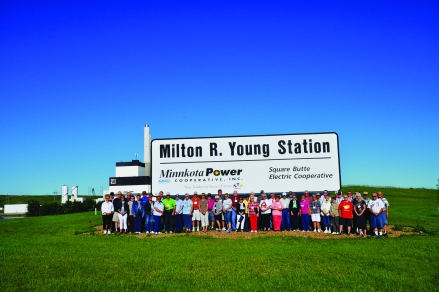 Electric cooperatives were established to provide electricity to rural America, and they now make up the largest electric utility network in the nation. In fact, cooperatives are responsible for distributing power to 75 percent of the U.S. land mass through 2.4 million miles of power lines. Within those 2.4 million miles are Cass County Electric Cooperative’s 4,800 miles of line, which distribute power to 10 counties in North Dakota.
Electric cooperatives were established to provide electricity to rural America, and they now make up the largest electric utility network in the nation. In fact, cooperatives are responsible for distributing power to 75 percent of the U.S. land mass through 2.4 million miles of power lines. Within those 2.4 million miles are Cass County Electric Cooperative’s 4,800 miles of line, which distribute power to 10 counties in North Dakota.
Those miles upon miles of lines and the members powered by them mean a lot to us. And being a co-op means a lot to us too.
It means we are owned by our members. That’s one of the reasons we are so committed to providing reliable electricity at an affordable rate. We’re always looking out for our member-owners.
It means we have high standards when it comes to serving you, which we measure according to our four core values of integrity, accountability, innovation and commitment to community.
It means we will always strive to educate our members on important issues affecting the cooperative so they will always be informed of the issues that could impact their power.
It means our members don’t just have access to information about their electricity, but convenient access at their fingertips. Through innovative technologies like SmartHub, members can view information about their energy use in real-time from any computer, smartphone or tablet.
It means our members get savings passed on to them as part of their membership. Whether it’s in the form of a purchased power adjustment holiday after a successful year, capital credits or Co-op Connections card savings, we’re often putting money back in members’ wallets.
It means our members have democratic control and can actively participate in electing representatives who set policies and make decisions affecting the cooperative. One way members can exercise this democratic control is by attending the annual meeting.
This year’s annual meeting will be held on Tuesday, April 22 at the Valley City Eagles Club, 345 12th Ave. NE, Valley City, N.D. Registration starts at 5:30 p.m. followed by a roast beef and cheesecake meal, entertainment and a business meeting. The meeting is free and open to all members.
Hear more about what it means to be a co-op member in our Power of Membership video.
Power and Your Property
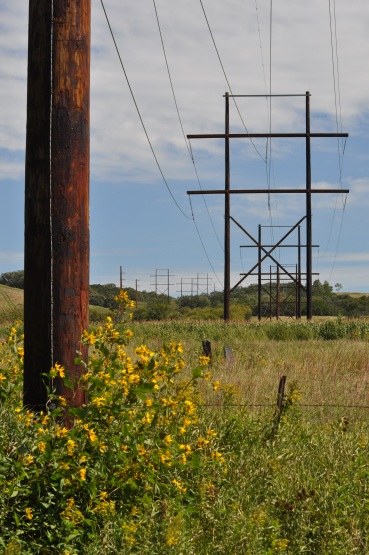 Have you noticed Cass County Electric Cooperative workers on your property? The work done by employees and contractors of CCEC often brings them to rights-of-way and easements in the service territory or on/near your private property and driveways. Making sure the power stays on is their number one priority, and to do that, these workers occasionally need to cross into members’ property. For instance, you might see CCEC employees/contractors:
Have you noticed Cass County Electric Cooperative workers on your property? The work done by employees and contractors of CCEC often brings them to rights-of-way and easements in the service territory or on/near your private property and driveways. Making sure the power stays on is their number one priority, and to do that, these workers occasionally need to cross into members’ property. For instance, you might see CCEC employees/contractors:
- Making routine repairs
- Restoring power outages
- Replacing meters
- Maintaining vegetation in rights-of-way, tree trimming and brush clearing
- Locating buried utilities for construction and digging projects
- Working to upgrade poles, wires, transformers and other equipment
- Inspecting lines, power poles, transformer boxes and other equipment
Work performed by employees and contractors of CCEC is normally conducted during the hours of 7.a.m. – 5p.m., Monday through Friday, unless it is an emergency power restoration situation.
If you have any concerns about the work CCEC conducts on or near your property, contact our engineering and operations department at 800-248-3292 or 701-356-4400.
Cass County Electric Cooperative Warns Members of Call Scam
Cass County Electric Cooperative is warning members of a reported calling scam involving utility customers. The culprits are placing phone calls to area residents and businesses claiming to be representatives of a utility company and threatening to turn power off if payment is not made by credit card immediately.
If you think you may have received a call from a scammer, or if you have a question regarding the status of your account, please contact CCEC directly.
To avoid being the victim of this scam and similar ones, CCEC recommends that members:
- Consider when the call was made and whether or not this is the first you are hearing of the issue discussed in the call. If you receive a call outside of normal business hours or if you are told there is an issue with your account that does not sound familiar or accurate, hang up and call CCEC directly to verify whether or not the call you received was legitimate.
- Consider the accuracy of the information being delivered in the call. Is the caller divulging specific information that pertains to you, or is he/she remaining generic enough to where the call could apply to anyone?
- Avoid revealing any personal information to suspicious callers.
- Call CCEC with a any questions at 701-356-4400.
Flood Preparedness = Safety Awareness
March 16-22 is National Flood Safety Awareness Week. And, rightfully so, because as the days inch their way toward spring, it is important to be prepared for any potential flooding that may arise with the change in temperatures. While we hope it will not be an issue for us this year, it is always better to be over-prepared than under-prepared. One way you can ensure your home is equipped for spring flooding is by investing in a standby generator that could be useful in the event of a power outage sparked by flooded electrical equipment. Standby generators allow you to keep your lights on and your essential appliances running smoothly in the event of an emergency outage.
Whether you already have a standby generator or you plan on getting one, it is critical that you exercise cautions when utilizing generators to ensure you and your family are protected. Fortunately, we have compiled several important tips to follow to ensure your generator is a solution to a problem and not a problem in itself.
First, check the fuel supply of your generator and charge the battery if it has one. A non-working generator isn’t much better than a lack of a generator altogether. Also, be sure when refueling your generator that the engine is cool. This helps prevent a potential fire if the tank overflows.
Next, run your generator under load for several minutes to ensure it is functioning appropriately. If you notice issues, schedule a maintenance appointment to have it fine-tuned before getting too far into the spring season.
Finally, once you have determined your generator is functioning properly, follow safety guidelines when using it, including:
- Keep the generator in a well-ventilated area and remove any debris that collects around it. Do not operate generators in confined spaces like garages, as they can produce carbon monoxide, which can be deadly if exposed in a poorly ventilated area.
- Avoid using your generator in an area where it can be exposed to water by keeping under a canopy on a dry surface above any puddles or water build-up.
- For permanent standby systems, have a qualified electrician wire your generator into your home using a transfer switch that will protect your family, neighbors and lineworkers from electricity backfeeding onto power lines.
- Do not connect portable generators directly to your home’s outlets or electrical system. Instead, use extension cords to plug appliances into outlets located on the generator.
- Make sure your generator is properly grounded for safety reasons.
- Avoid overloading your generator and only use it to power essential appliances.
- Make sure nothing is plugged into the generator before turning it on and be sure to turn off all equipment powered by the system before shutting your generator down.
- Keep a fire extinguisher near the generator in case of emergencies.
- Do not fuel your standby generator while it is running.
- Pay close attention to the manufacturer’s instructions that apply to your specific model of standby generator when grounding and operating your device.
All About Outages
Last year, Cass County Electric Cooperative’s reliability rating was 99.9828%. For the average person living on the CCEC system, power was out for less than two hours in 2013. But, with more than 39,000 members in our service territory, more than 4,700 miles of line on our system and 10 counties served by our cooperative, sometimes an issue arises and contributes to that .0172% of the time where you find yourself without power. While we strive to provide consistent, reliable power at all times, construction, storms and even the occasional squirrel can create a disruption to your service — and we want you to be prepared for those events if they happen.
Readying Yourself Before
Don’t let an outage catch you unprepared. In the event an unexpected outage would occur, it’s a good idea to have the following items on-hand in your home:
- Flashlights with extra batteries
- Gallon jugs of water
- Non-perishable food items
- First aid kit
- Blankets
- Back-up cell phone battery charger (“juice packs”)
- Battery-operated radio
- Coolers and ice to keep refrigerated food cold
- A back-up generator (Note: In the event of an outage, do NOT connect your generator to your home’s power system, unless you have had a professional install it this way. Connecting your generator to the system yourself can send electricity back down power lines and have fatal consequences for those working to restore your power.)
Reacting During
When you do notice the power has gone out in your home, it can be inconvenient and even scary. But being aware of what to do during an outage can make your experience much easier. Follow these steps if you find yourself in an outage situation:
- If you have a smartphone, tablet or laptop, visit our social media page to see if any information has been reported on the outage yet. Many of your questions will be updated there first, so checking these sites can ensure you stay updated as we have more information. You can also view the outage map at outage.kwh.com to see which areas are affected by the outage.
- Call 701-356-4499 or 1-888-277-4424 to report an outage. Our Interactive Voice Response (IVR) system helps members call in with specific information that allows CCEC to pinpoint the problem. For text updates related to outages, you can also text CCINFO to 85700 for related announcements.
- Turn off or disconnect some of your major electrical appliances and equipment. When the power returns, it could create a surge that could damage equipment that is still plugged in.
- Avoid opening and closing your freezer and refrigerator, when possible. When consuming food in a prolonged outage, use the perishable food in your refrigerator first, then food from your freezer. Consume non-perishable items last.
- When using back-up sources of electricity, never use them inside your home or garage, as they can release carbon monoxide, which is extremely dangerous in a non-ventilated area.
- If the power outage occurs in the winter, dress in layers to stay warm. Be sure to wear a hat and gloves, as much of your body heat escapes from your head and hands.
Recovering After
- Be sure to stay away from and report any downed power lines near you.
- Check refrigerated food that was exposed to higher temperatures before consuming. As a general rule, if food from your refrigerator was exposed to temperatures higher than 40° F for more than two hours, throw it out. If food from your freezer is colder than 40° F or still has ice crystals on it, you can generally refreeze it.
- If you experienced inconveniences that could have been prevented during the outage (i.e. your cell phone died), make a note to yourself to prepare for those situations so you are ready in the event you experience another outage in the future (i.e. purchase a back-up battery charger).
We never hope you have to use these tips, but we always want you to be prepared in the event that you do. If you have questions about how to prepare for or handle a power outage, comment here or give us a call. It’s better to ask them now.
The Power of Membership
Mark your calendars! Cass County Electric Cooperative’s annual meeting is scheduled for Tuesday, April 22 at the Valley City Eagles Club.
This year’s theme is The Power of Membership. Because as a member, you have the power: the power to have a voice in how the co-op is run, the power to energize and enhance your life with affordable electricity and the power to save money through responsible energy use and giving back to our local communities.
Being a member/owner of your electric cooperative gives you:
The power of electricity: the ability to energize your home with the consistent, reliable power that you need in your everyday life.
The power of value: the ability to stay connected at an affordable rate of $0.11/kwh.
The power of working together: the ability to collaborate with your cooperative on how to conserve energy and save money.
The power of connections: the ability to save on more than just electricity, by presenting your Co-op Connections Card at participating businesses.
These are just a few of the ways it pays to be a cooperative member. We hope to see you at the annual meeting, where you can learn even more about the power of your cooperative membership.
Be Safe, Not Sorry
As the temperature starts to rise and those feelings of dread when heading outdoors disappear, you may start spending a little more time outside. (I mean, 40s is practically shorts weather around here, right?)
However, because being outside increases your exposure to power lines, and also because we want your time enjoying the warmer weather to be safe and enjoyable, we’ve compiled some power line safety reminders for you and your family to ensure you stay safe during your outdoor activities.
- In general, keep your distance from power lines. Contact with these lines can be dangerous, or even fatal. So whether you are playing outside with your children or working on a project in your yard, keep your distance from power lines, meters, transformers and electrical boxes.
- Make sure you or your children do not climb ladders or trees near power lines, as this can increase risk of exposure to the line.
- Avoid flying kites or remote control-operated toys near lines. If you accidentally get an object stuck in a power line, do not try to remove it yourself. Call Cass County Electric Cooperative to remove it for you.
- If you notice a downed power line, do not go near it. Even more importantly, do not touch the line or even anything that the line may be touching.
- If you are ever in a situation where a power line falls on your vehicle, do not attempt to exit the vehicle unless it starts on fire. If the vehicle is not on fire, call for help and warn any bystanders not to touch the car or the downed line. In a situation where your car does start on fire, open the door and jump — do not step — from the vehicle. Then, shuffle your feet until you are 50 or more feet away from your automobile.
If you have any doubts about whether or not a power line poses a risk to your safety in a certain situation, call Cass County Electric Cooperative at 800-248-3292 for clarification.
Six More Weeks?
Puxsutawney Phil saw his shadow on Sunday, foreboding that we’ll have six more weeks of winter upon us. For those of you ready to pack your bags and move to Florida, don’t book your plane tickets just yet. We have some helpful tips that will help you save energy while staying warm amidst the extended winter.
- Sunlight is your friend. As we get closer to spring, it stays lighter longer — which means you have a great opportunity to heat your home naturally. Leave your window coverings open during the day to let in that natural light and let the sun heat your home in the process.
- Be cautious when using space heaters. While portable heaters can be effective in warming up cold spaces, they consume quite a bit of energy. If you are going to supplement your heating with a space heater, avoid falling prey to marketing claims that certain space heaters are more energy efficient. Whether you spend $30 or $300 on your space heater, it is the wattage that predicts energy use. If the cheap device and the expensive one are both 1,500-watt heaters, they will produce the same heat and use the same energy, despite the cost difference.
- Remember to continue checking your air filter — about once a month — and change it whenever it looks dirty. A clogged filter does not function at its fullest potential and makes your heating system work harder to keep you warm.
- Keep your water heater below 125° to avoid unnecessary energy consumption that is accompanied by water heater thermostats set at 140°. Plus, reducing the temperature also slows pipe and water heater corrosion.
The groundhog has spoken, and we likely won’t see signs of spring anytime soon — but don’t break out the suitcases and bathing suits just yet. With the coldest days (hopefully) already behind us, these easy energy-saving tips should help you withstand the last weeks of winter.

